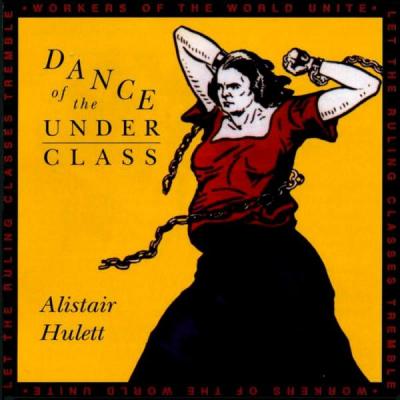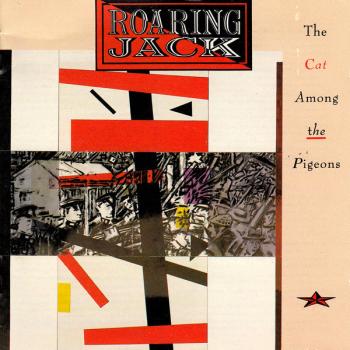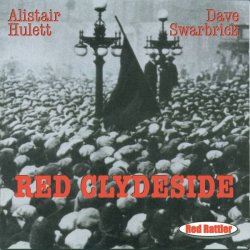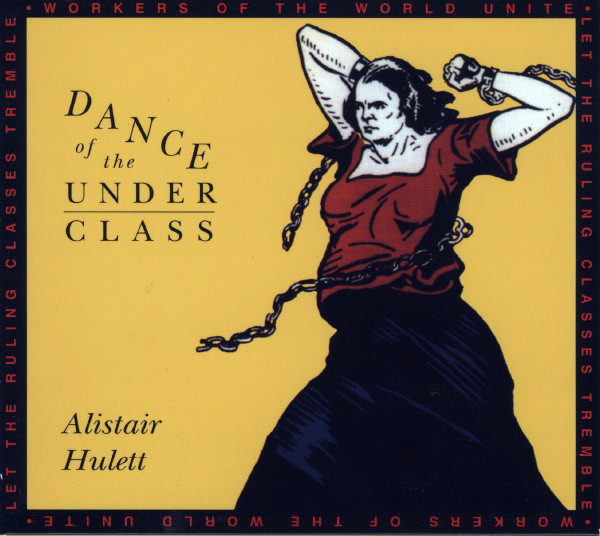Dictatorship of Capital

You're trying to tell me capital has won at last
(Continues)
(Continues)
Contributed by Dq82 2017/7/21 - 22:08
Blue Murder

1995
Saturday Johnny & Jimmy the Rat – Hulett and Swarbrick
Blue Murder’ was one of two songs he wrote about the suffering of those who worked in the blue asbestos mine in Wittenoom, Western Australia. Countless miners and their families who paid with their health and lives after being exposed to lethal asbestos fibres, a health hazard well known to those who ran the mine.
Alistair originally wrote the song for a play while still in Roaring Jack. He eventually recorded it for his third solo album “Saturday Johnny & Jimmy the Rat”, together with folk legend Dave Swarbrick on fiddle!
Saturday Johnny & Jimmy the Rat – Hulett and Swarbrick
Blue Murder’ was one of two songs he wrote about the suffering of those who worked in the blue asbestos mine in Wittenoom, Western Australia. Countless miners and their families who paid with their health and lives after being exposed to lethal asbestos fibres, a health hazard well known to those who ran the mine.
Alistair originally wrote the song for a play while still in Roaring Jack. He eventually recorded it for his third solo album “Saturday Johnny & Jimmy the Rat”, together with folk legend Dave Swarbrick on fiddle!
They say it’s easy money
(Continues)
(Continues)
Contributed by Dq82 2017/7/21 - 21:58
Song Itineraries:
The War of Labour: Emigration, Immigration, Exploitation, Slavery
Don’t Sign Up for War

2002
Red Clydeside
With Dave Swarbrick
The years 1915 to 1919 saw a huge explosion of working class militancy in response to the First World War which brought Britain almost to the brink of revolution. One of the most important centres of struggle was Glasgow and the Clyde. 'Red Clydeside', a CD written and performed by Alistair Hulett, celebrates its foremost protagonist, John Maclean, and the men and women who contributed to this often neglected period of our history.
The song Don’t Sign Up For War’ is based on one of John McLean’s famous quotes during the lead up to the First World War when he encouraged young men to defer from signing up.
Red Clydeside
With Dave Swarbrick
The years 1915 to 1919 saw a huge explosion of working class militancy in response to the First World War which brought Britain almost to the brink of revolution. One of the most important centres of struggle was Glasgow and the Clyde. 'Red Clydeside', a CD written and performed by Alistair Hulett, celebrates its foremost protagonist, John Maclean, and the men and women who contributed to this often neglected period of our history.
The song Don’t Sign Up For War’ is based on one of John McLean’s famous quotes during the lead up to the First World War when he encouraged young men to defer from signing up.
See thon Arthur Henderson, heid bummer o' the workin, men (1)
(Continues)
(Continues)
Contributed by DoNQuijote82 2014/2/9 - 17:56
Song Itineraries:
Deserters
The Day that the Boys Came Down

[1988]
Album "The Cat Among The Pigeons", con la formazione dei Roaring Jack
La canzone è dedicata alle frequenti "morti sotto custodia" di cui sono vittime in Australia gli aborigeni per mano delle forze di polizia. Nemmeno un anno dopo l'uscita dell'album in cui è contenuto questo brano, una squadra speciale della polizia di Sidney uccise a sangue freddo, durante un'irruzione illegale, un giovane aborigeno di nome David Gundy. Da quel momento Hulett ha sempre dedicato a David Gundy la canzone quando la esegue dal vivo.
"Deaths in police custody are all too frequent in our country. Aboriginal people and ethnic minorities are usually on the receiving end of it and the majority by its silence displays its indifference. The Day that the Boys Came Down is set to a bluesy shuffle with a music hall feel to the tune The Baron of Brackley on a dog day afternoon." (Alistair Hulett)
"Our penultimate... (Continues)
Album "The Cat Among The Pigeons", con la formazione dei Roaring Jack
La canzone è dedicata alle frequenti "morti sotto custodia" di cui sono vittime in Australia gli aborigeni per mano delle forze di polizia. Nemmeno un anno dopo l'uscita dell'album in cui è contenuto questo brano, una squadra speciale della polizia di Sidney uccise a sangue freddo, durante un'irruzione illegale, un giovane aborigeno di nome David Gundy. Da quel momento Hulett ha sempre dedicato a David Gundy la canzone quando la esegue dal vivo.
"Deaths in police custody are all too frequent in our country. Aboriginal people and ethnic minorities are usually on the receiving end of it and the majority by its silence displays its indifference. The Day that the Boys Came Down is set to a bluesy shuffle with a music hall feel to the tune The Baron of Brackley on a dog day afternoon." (Alistair Hulett)
"Our penultimate... (Continues)
They came down from the backstreet, the thingys and the flatfeet
(Continues)
(Continues)
Contributed by Alessandro 2009/10/3 - 06:17
The Cat Among The Pigeons

[1988]
Album "The Cat Among The Pigeons", con la formazione dei Roaring Jack.
"The Cat Among the Pigeons is a set of Celtic tunes prefaced by a short piece of acoustic ambience by the Roaring Jack Folk Orchestra, playing zither, guitar, dulcimer, whistle, accordion, cittern, fiddle and bodhran. Alistair rants for a bit about revolutionary socialism before the electric ensemble takes off with a medley of workers’ tunes from Brittany, America, Scotland and Ireland, with a jig nicked off Dave Pegg thrown in for good measure." (Alistair Hulett)
Album "The Cat Among The Pigeons", con la formazione dei Roaring Jack.
"The Cat Among the Pigeons is a set of Celtic tunes prefaced by a short piece of acoustic ambience by the Roaring Jack Folk Orchestra, playing zither, guitar, dulcimer, whistle, accordion, cittern, fiddle and bodhran. Alistair rants for a bit about revolutionary socialism before the electric ensemble takes off with a medley of workers’ tunes from Brittany, America, Scotland and Ireland, with a jig nicked off Dave Pegg thrown in for good measure." (Alistair Hulett)
From the killing fields of Vietnam to the backstreets of old Derry Town
(Continues)
(Continues)
Contributed by Alessandro 2009/10/3 - 05:50
A Stranger and a Friend
[1989]
Album "Through The Smoke Of Innocence", con la formazione dei Roaring Jack.
Album "Through The Smoke Of Innocence", con la formazione dei Roaring Jack.
The creeks are frozen over now
(Continues)
(Continues)
Contributed by Alessandro 2009/10/3 - 05:29
The Red Clydesiders

[2002]
Album "Red Clydeside", con Dave Swarbrick.
Con l'espressione "Red Clydeside" viene indicato un periodo di grande fermento rivoluzionario che in Scozia investì Glasgow e altre aree urbane in prossimità del River Clyde tra il 1910 e i primi anni '30.
Personaggi come Willie Gallacher, John Maclean (vedi The John MacLean March e Ballad Of John MacLean), James Maxton, Mary Barbour e gli altri citati nel brano furono i leader di un non breve periodo di lotte contro la guerra, per il diritto alla casa, per migliori condizioni di lavoro. Il Red Clydeside ebbe il suo episodio più cruento il 31 gennaio 1919 quando polizia ed esercito tentarono di porre fine ad uno sciopero di massa. Negli scontri in George Square, nel centro di Galsgow, i manifestanti ebbero la meglio sulle forze dell'ordine, armate fino ai denti ma impreparate. Per fortuna non fu un massacro, ma moltissimi furono i feriti... (Continues)
Album "Red Clydeside", con Dave Swarbrick.
Con l'espressione "Red Clydeside" viene indicato un periodo di grande fermento rivoluzionario che in Scozia investì Glasgow e altre aree urbane in prossimità del River Clyde tra il 1910 e i primi anni '30.
Personaggi come Willie Gallacher, John Maclean (vedi The John MacLean March e Ballad Of John MacLean), James Maxton, Mary Barbour e gli altri citati nel brano furono i leader di un non breve periodo di lotte contro la guerra, per il diritto alla casa, per migliori condizioni di lavoro. Il Red Clydeside ebbe il suo episodio più cruento il 31 gennaio 1919 quando polizia ed esercito tentarono di porre fine ad uno sciopero di massa. Negli scontri in George Square, nel centro di Galsgow, i manifestanti ebbero la meglio sulle forze dell'ordine, armate fino ai denti ma impreparate. Per fortuna non fu un massacro, ma moltissimi furono i feriti... (Continues)
Jimmy Maxton, James McDougall, Barbour, Gallacher and McShane
(Continues)
(Continues)
Contributed by Alessandro 2009/9/30 - 15:19
Song Itineraries:
The War of Labour: Emigration, Immigration, Exploitation, Slavery
The Swaggies Have All Waltzed Matilda Away

[1991]
Album "Dance of the Underclass"
La storia dell'Australia è intrisa di sangue.
I settlers (coloni) e gli swaggies (i precari delle braccia) immigrati (o deportati, che sovente si trattava di criminali comuni) dalla Gran Bretagna facevano spesso una vita di merda, rompendosi la schiena nei campi o perdendo la vita nelle varie guerre bandite dalla Corona...
A sua volta, la "nuova Australia" stritolò senza pietà "Koorie", la "vecchia Australia" aborigena...
Il titolo fa ovviamente riferimento alla più famosa tra le ballate popolari australiane, Waltzing Matilda.
Album "Dance of the Underclass"
La storia dell'Australia è intrisa di sangue.
I settlers (coloni) e gli swaggies (i precari delle braccia) immigrati (o deportati, che sovente si trattava di criminali comuni) dalla Gran Bretagna facevano spesso una vita di merda, rompendosi la schiena nei campi o perdendo la vita nelle varie guerre bandite dalla Corona...
A sua volta, la "nuova Australia" stritolò senza pietà "Koorie", la "vecchia Australia" aborigena...
Il titolo fa ovviamente riferimento alla più famosa tra le ballate popolari australiane, Waltzing Matilda.
You came to this country in fetters and chains
(Continues)
(Continues)
Contributed by Alessandro 2009/9/30 - 13:51
He Fades Away

[1991]
Album "Dance of the Underclass"
Quando la miniera non lo uccide intrappolando nelle viscere della terra, spesso il minatore è comunque destinato ad una morte lenta per antracosi o silicosi o enfisema...
Album "Dance of the Underclass"
Quando la miniera non lo uccide intrappolando nelle viscere della terra, spesso il minatore è comunque destinato ad una morte lenta per antracosi o silicosi o enfisema...
There's a man in my bed I used to love him
(Continues)
(Continues)
Contributed by Alessandro 2009/9/30 - 13:20
Song Itineraries:
The War of Labour: Emigration, Immigration, Exploitation, Slavery
×
![]()

Dance of the underclass